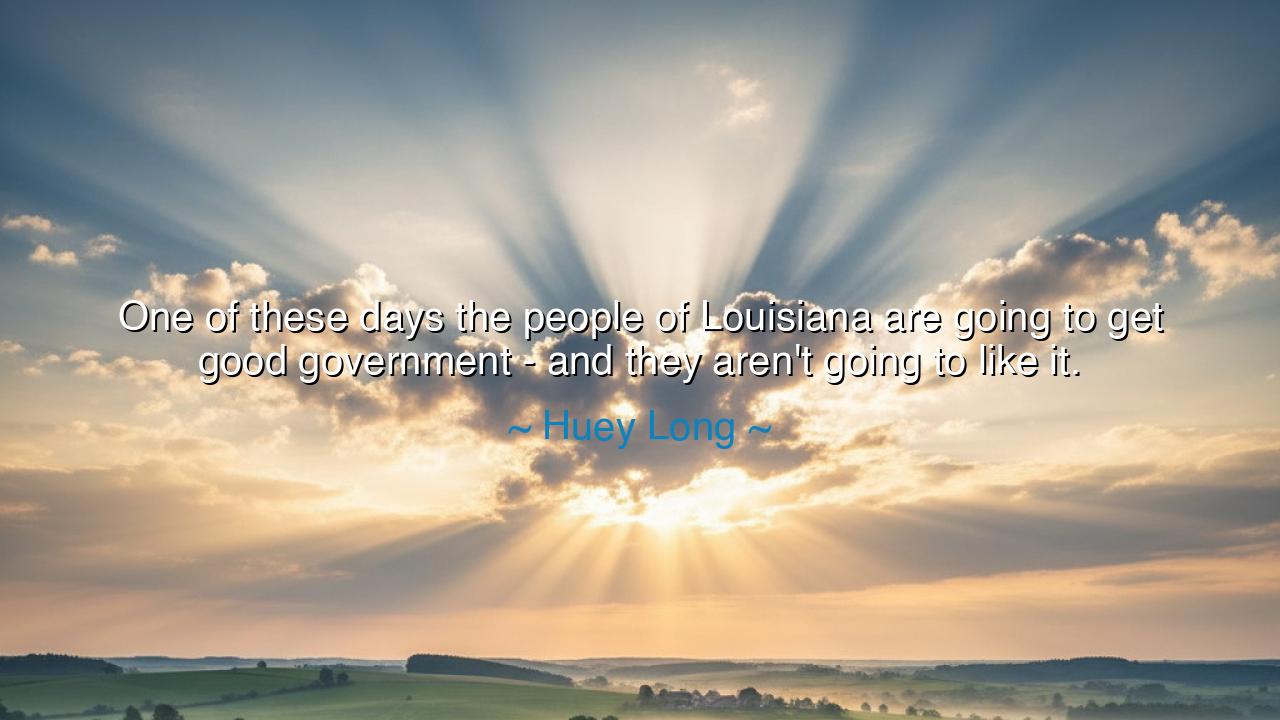
One of these days the people of Louisiana are going to get good
One of these days the people of Louisiana are going to get good government - and they aren't going to like it.






In the rough and roaring days of American politics, when charisma and cunning walked hand in hand, Huey Long, the “Kingfish” of Louisiana, spoke a prophecy both sharp and mocking: “One of these days the people of Louisiana are going to get good government—and they aren’t going to like it.” On its surface, the words shimmer with humor, but beneath the jest lies a deep and unsettling truth about human nature, about power, and about the uneasy marriage between freedom and discipline. Long, a man both loved and feared, understood his people too well. He knew that the cry for reform often dies when reform begins to demand sacrifice.
Huey Long was no ordinary governor. He rose from humble roots to become one of the most powerful and controversial figures in America during the Great Depression. To the poor, he was a savior—a man who tore wealth from the hands of the mighty and scattered it among the forgotten. To his enemies, he was a demagogue, a would-be tyrant cloaked in the language of justice. Yet whatever one thought of him, none could deny that he possessed a profound understanding of the common heart. When he said that people would not like “good government,” he was not speaking out of cynicism alone. He was naming a truth: that good governance, like virtue, is often painful, demanding discipline, honesty, and accountability—qualities that shine in theory but sting in practice.
The origin of his words lies in the soil of Louisiana itself, a land rich in beauty and corruption alike. In his time, the state’s politics were riddled with patronage and greed. The people had grown used to a system where favors flowed like water and justice bent to the strong. Long built his empire not by cleansing this system, but by mastering it. He gave the people roads, hospitals, and schools—but he ruled with iron. He mocked “good government” because he knew that pure reform, stripped of populism and favor, would feel cold to those accustomed to the warmth of personal reward. To many, good government would mean not gifts, but rules; not favors, but fairness. And fairness, though righteous, is rarely pleasing.
History bears witness to this truth in other lands and other times. When Cato the Younger, the Roman senator famed for his incorruptible virtue, sought to cleanse the Senate of bribery and indulgence, his austerity enraged the very people he sought to protect. Rome, weary of purity, soon turned its heart to Caesar, who offered glory instead of restraint. Thus fell the republic, not to a conqueror, but to the people’s own desire for comfort over integrity. Like Huey Long, Cato learned that the path of virtue is lonely when the people crave indulgence more than righteousness.
Long’s words strike deeper still, for they speak to the eternal paradox of democracy. The people are both masters and servants of their fate. They demand justice, yet often resist the cost it requires. They decry corruption, yet welcome the spoils of favoritism when it favors them. In every generation, nations wrestle with this contradiction: the yearning for good government that does not inconvenience them. Huey Long’s jest was not merely about Louisiana—it was about humanity itself, that strange and self-defeating creature that loves freedom but shuns the discipline it demands.
Yet let us not take his saying as prophecy of despair, but as a challenge of wisdom. For while it is true that good government demands sacrifice, it also calls forth the noblest qualities of the people—their courage, patience, and sense of duty. To accept honest rule is to accept responsibility for one’s own share in the common good. It is to trade the comfort of dependency for the strength of self-governance. The people must learn to love what sustains them, not merely what pleases them. As Aristotle once taught, “The good citizen makes the state good.” Without the virtue of the people, even the best government becomes a corpse without breath.
The lesson of Huey Long’s words, therefore, is not that people are doomed to reject righteousness, but that they must be taught to recognize its face even when it is stern. True governance is not the art of pleasing everyone, but of guiding them toward the higher good. It is a covenant between leader and citizen, built not on the sugar of promises but on the iron of principle. For when the day comes that the people of any land truly welcome good government, even when it demands much of them, then that nation will have crossed the threshold from survival to greatness.
And so, my child of the republic, remember this ancient wisdom: beware of the leader who offers only ease, and cherish the one who offers integrity. When good government finally comes—when it demands your honesty, your taxes, your patience—do not recoil, for it is not your enemy, but your mirror. The people and their government are one body; and just as the body thrives by discipline, so too does a nation thrive when its people embrace the burdens that freedom requires. For liberty without virtue is only chaos in disguise, and good government, though it may be unwelcome at first, is the truest friend a free people can ever have.






AAdministratorAdministrator
Welcome, honored guests. Please leave a comment, we will respond soon